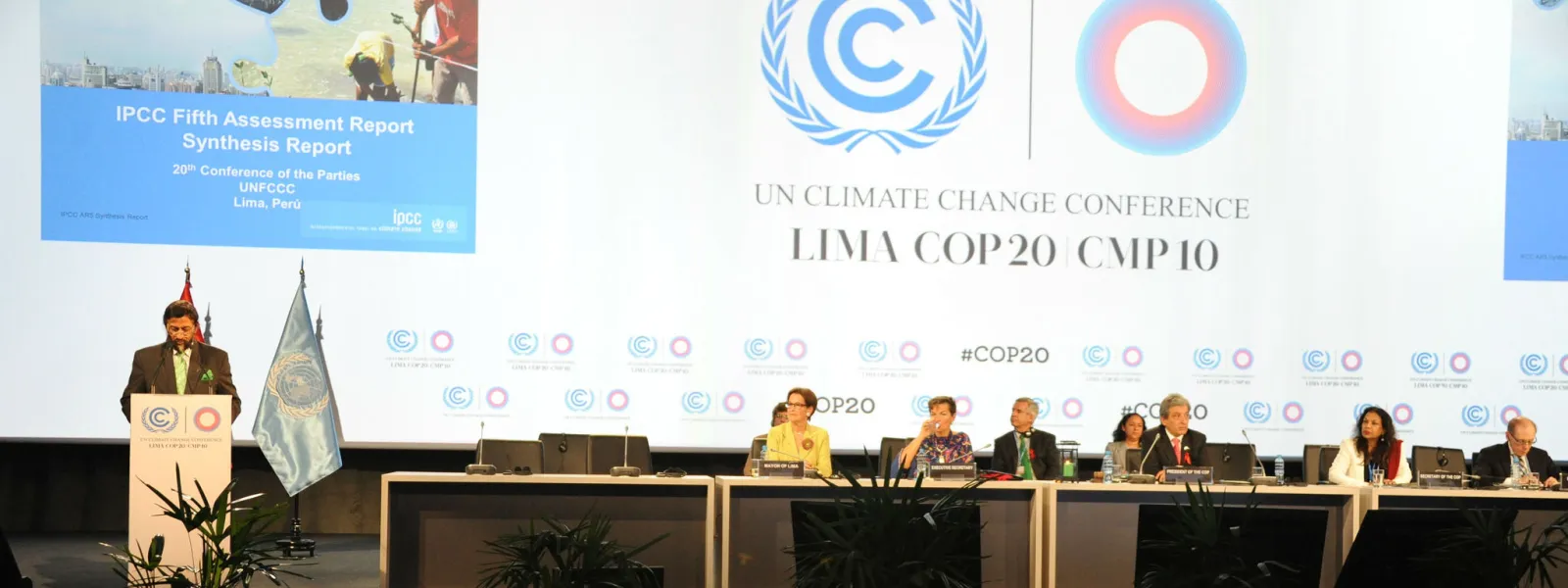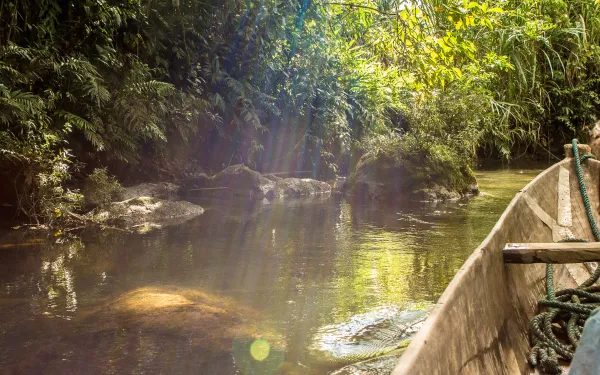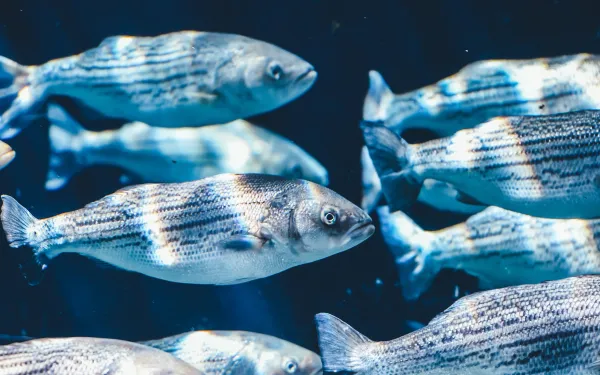
Project
Photo: UNFCCCMonitoring the UN Climate Negotiations
As changes in climate become more extreme, their affects are being hardest felt throughout developing countries. Since 1994, the United Nations Framework Convention on Climate Change has laid out actions to limit the increase of global average temperatures and confront the impacts of climate change.
The States that are Parties to the Convention meet every year in the so-called Conference of the Parties (COP) to review their commitments, the progress made in fulfilling them, and pending challenges in the global fight against the climate crisis.
At COP21 in 2015, they adopted the Paris Agreement, which seeks to strengthen the global response to the climate emergency, establishing a common framework for all countries to work on the basis of their capacities and through the presentation of Nationally Determined Contributions (NDC) that will:
- Limit the increase in global temperatures to 2°C compared to pre-industrial levels and continue efforts to limit it to 1.5°C;
- Increase the capacity of countries to adapt to the impacts of climate change; and
- Ensure that financing responds to the goal of reducing greenhouse gas emissions.
Our focus areas
THE CLIMATE CRISIS AND HUMAN RIGHTS
The climate crisis, due to its transversal character, has repercussions in various fields, geographies, contexts and people. In this regard, the Preamble to the Paris Agreement states that it is the obligation of States to "respect, promote and fulfill their respective obligations on human rights, the right to health, the rights of indigenous peoples, local communities, migrants, children, persons with disabilities and people in vulnerable situations and the right to development, as well as gender equality, the empowerment of women and intergenerational equity."
AIDA at the COP
COP25: Chile-Madrid 2019
At COP25 in Madrid, Spain, we advocated for the inclusion of the human rights perspective in various agenda items. We promoted the incorporation of broad socio-environmental safeguards in the regulation of Article 6 of the Paris Agreement, which refers to carbon markets. We closely followed the adoption of the Gender Action Plan, as well as the Santiago Network, created "to catalyze technical assistance […] in developing countries that are particularly vulnerable to the adverse affects of climate change." We also encouraged the inclusion of ambitious and measurable targets for the reduction of short-lived climate pollutants in the climate commitments of States.
Related projects

Examining the obstacles to energy transition in Latin America
The climate crisis and its impacts on human rights require the governments of Latin America to design and implement laws, public policies, and other measures aimed at protecting the lives and integrity of their people. In the region most threatened by global warming, they must do so through mitigation, adaptation and attention to the losses and damages already caused. Given that the current energy system based on fossil fuels is the main cause of the climate crisis, as well as the inequalities that are closely linked to it, the framework for climate action in the Americas must be that of a just energy transition. The energy transition is an opportunity for the continent to abandon old energy production models characterized by large social and environmental impacts, and to move towards environmentally and climatically sustainable methods, while respecting the human rights of the communities and sectors involved. Several countries in the region are failing to integrate this perspective. The case of Colombia exemplifies a risky trend for the region—the government is currently promoting a host of climate-aggravating projects, which deepen dependence on fossil fuels, as useful to the energy transition. Such regressive measures include: the expansion of coalmines in operation or the opening of new mines under the argument that the export of the mineral will finance the transition; and the favoring of natural gas exploitation through tax benefits and the easing of environmental permitting processes, under the false premise that gas is a clean energy source. Sounding the alarm Given the worrying panorama in Colombia, AIDA will be drafting and distributing a series of Urgent Alerts that call attention to projects, public policies and regulations that hinder a just transition, and deepen dependence on fossil fuels. They will be collective alerts, supported by other international organizations that, like AIDA, seek climate justice and work in defense of environmental and human rights. Each alert will be sent to the national authorities in charge of the measure in question. Geared toward promoting reflections on how to advance in the just energy transition, each alert will include public policy and regulatory recommendations based on the State's international obligations and commitments on climate, environmental and human rights issues. In each case, the message is clear—by continuing with the promotion, extraction and use of gas and coal, the Colombian State would be failing to comply with these obligations. The first alert calls attention to the potential definitive diversion of the Bruno stream in the department of La Guajira to expand production at and revenue from El Cerrejón, the largest open-pit coal mine in Latin America and one of the ten largest in the world. The project not only implies an increase in greenhouse gas emissions—coal is responsible for 44 percent of global carbon dioxide emissions—but is also a threat to the rights to water, food security and health of the Wayuu indigenous communities that depend on the stream. A regional scope The measures adopted by the Colombian State may well reflect the situation in other countries of the region, or be replicated in them. Several alerts will refer to the exploitation of hydrocarbons through fracking, a controversial technique advancing blindly in Colombia and other Latin American countries. Another will warn of the use of hydrogen, promoted as a viable and clean energy alternative. In Colombia there is already a public policy route to advance with its implementation and two pilot projects underway. Hydrogen production results from burning coal or gas at high temperatures. Recent studies warn that this requires capturing and storing carbon dioxide, so the alternative depends on being able to store carbon indefinitely and avoid leakage into the atmosphere. In addition, hydrogen production is energy-intensive and involves the emission of gases during the heating and pressurization process, as well as the use of natural gas as fuel. As a region, we cannot afford to delay the energy transition and the achievement of climate justice, both urgent and necessary goals, with options that will only tie us more and more to fossil fuels and to an energy system that only intensifies social inequalities and environmental degradation.
Read more
AIDA celebrates WTO agreement to curb harmful fisheries subsidies
We consider the agreement a "crucial step" for the sustainability of fishery resources in the short, medium and long term, as well as for ensuring food security and the livelihoods of coastal communities. Geneva, Switzerland. As an environmental organization that has closely followed the negotiations to limit global fisheries subsidies, the Interamerican Association for Environmental Defense (AIDA) applauds that member countries of the World Trade Organization (WTO) reached, after more than two decades, a binding agreement to curb some harmful fisheries subsidies. It represents a fundamental step toward achieving the effective management of our fisheries resources, as well as toward ensuring global food security and the livelihoods of coastal communities. "This is a crucial step towards ensuring the sustainability of fishery resources in the short, medium and long term," said Gladys Martinez de Lemos, executive director of AIDA. "We urge the 164 member countries of the WTO to ratify the agreement as soon as possible, and to implement the necessary changes derived from it to contribute significantly to the health of marine life and the well-being of those who depend on it." It is estimated that, each year, governments spend approximately $22 billion in negative subsidies to offset costs for fuel, fishing gear and vessel improvements, among others. As a result of that support, 63 percent of fish stocks worldwide must be rebuilt and 34 percent are fished at "biologically unsustainable" levels, according to recent data. The agreement reached at the 12th WTO Ministerial Conference, held June 12-16, provides for the creation of a global framework to reduce subsidies for illegal, unreported and unregulated fishing; subsidies for fishing overexploited stocks; and subsidies for vessels fishing on the unregulated high seas. The high seas fishing provisions represent an achievement for Latin America, a region whose fishing industry is severely threatened by aggressive foreign fleets fishing inside and outside of national jurisdictions. The agreement also includes measures aimed at greater transparency and accountability in the way governments support their fisheries sector. The countries agreed to continue negotiating rules to curb subsidies that promote fishing in other countries' waters, overfishing and the overcapacity of a fleet to catch more fish than is sustainable. "This agreement is one part of the movement we need at the international level to contribute to the health of the ocean," explained Magie Rodríguez, AIDA attorney. "We have three more to go: the high seas treaty, more ambitious and rigorous standards for ocean mining, and recognition of the key role the ocean plays in the climate crisis. We will continue to work with our allies to achieve these goals.” Although negotiations on fisheries subsidies officially began in 2001, it was not until the 2017 WTO Ministerial Conference that countries committed to taking action to reach an agreement at the next conference—which was to take place in December 2020, but was suspended due to the pandemic. This commitment also responds to the fulfillment of target 14.6 of the United Nations Sustainable Development Goals. In 2021, the Ministerial Conference failed to reach an agreement, but it did reach a draft text. "This year's achievement would not have been possible without the joint efforts of many different organizations, academia, governments and the private sector," said Martinez. press contact Victor Quintanilla (Mexico), [email protected], +525570522107
Read more
What is a just energy transition?
It is possible to propose real solutions to current problems. The various crises facing humanity—climate, energy, food, environment, health—as well as the enormous inequalities that cause, and are deepened by, them can be overcome if we manage to rethink the systems in which we live. In 2021, the energy sector contributed 73.2 percent of total global greenhouse gas emissions. The current energy system, based on fossil fuels, is unequal and inequitable. It is concentrated in large private or state-owned companies, is particularly conflictive in terms of access to resources, and is closed to social participation in decision-making. For these reasons, progress on the energy transition is urgent. There is no single view of energy transition; it is a concept in dispute. Toward what? For whom? How? Conservative views focus the transition on a process of technological substitution toward a change in the energy matrix focused on renewable resources and the search for energy efficiency. On the other hand, the most complete proposals warn that a change in the energy matrix is necessary, but not enough. They see the transition as a process of integral transformation, territorially situated and plural, which implies the creation of new socio-political conditions that restructure the organization, ownership and distribution of the current production and consumption systems. The goal is advancing the right to energy. If we consider the transition as a systems change, it is essential to build another type of relationship between human beings, nature and means of production. Guidelines for thinking about the energy transition in Latin America Based on the arguments of Pablo Bertinat, an expert on the subject, to walk this path in the region requires that we: Build the right to energy as a collective right, in congruence with the rights of nature. We must: take into account the damages to territories and communities created by energy development; eradicate Sacrifice Zones by recognizing their vulnerability; and guarantee respect for human rights during the transition. Solve energy poverty problems with clean, accessible, reliable and affordable energy. Energy projects must benefit the territory in which they are installed in terms of creation, supply and work force, in order to achieve the redistribution of wealth. Advance a process of energy reduction in the face of a scenario of restriction in which resources do not cover the demand. This implies an integral transition. A new productive model based on the availability of energy must be considered, as well as rethinking transportation systems, agriculture, infrastructure, etc. Deepen the change of the energy matrix from processes of resignification of technologies to those that are adequate, that is to say, that allow social inclusion, that are built from the communities, that are oriented to solve their problems, and that take into account the processes of acceptance of new energy enterprises. Promote energy democratization processes through the participation of diverse actors, particularly excluded sectors, in decision-making regarding the transition and the creation and implementation of policies, guaranteeing the rights of access to timely and complete information, quality participation and access to environmental justice, in order to ensure energy autonomy at the local level. In conclusion, speaking of a just energy transition implies recovering energy as a tool to satisfy human needs in a context of finite resources and inequalities. We must not start from scratch. Local communities, academic institutions, non-governmental organizations, social organizations and governments have already taken important steps towards a just, democratic and popular energy transition in the region. With this momentum, the transition is not only desirable, but possible.
Read more